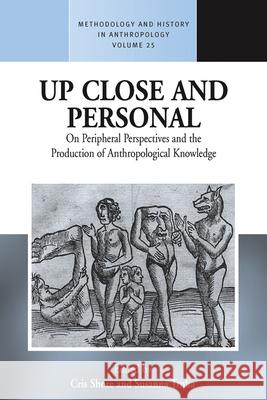Up Close and Personal: On Peripheral Perspectives and the Production of Anthropological Knowledge » książka
Up Close and Personal: On Peripheral Perspectives and the Production of Anthropological Knowledge
ISBN-13: 9781782380429 / Angielski / Miękka / 2015 / 284 str.
"The book thus offers both unsettling and highlyvinspirational reading material, especially forvacademics emerging from the world's metropolises. It raises issues that are frequently overlooked and which represent unavoidable starting points for those doing anthropology today in the Antipodes and elsewhere." - Social Anthropology/Anthropologie sociale "This book is a good and lively read, constructed so as to draw the readers into the discussion, to make us reach our own conclusions and also to do what most of us like best: to listen carefully and to draw conclusions from the stories told to us and for us." - Sites "A stimulating collection of interviews....Its value is in the biographical glimpses, intellectual perspectives and methodological insights each offer into their work. The dialogical approach works well.... T]he volume illustrates the dynamic relationship between anthropological theorizing and political practice. Rather than celebrate anthropology, the book's role is perhaps to champion iconoclasm and the unorthodox approaches that seem to characterize many anthropological careers." - David Mills, Oxford University Combining rich personal accounts from twelve veteran anthropologists with reflexive analyses of the state of anthropology today, this book is a treatise on theory and method offering fresh insights into the production of anthropological knowledge, from the creation of key concepts to major paradigm shifts. Particular focus is given to how 'peripheral perspectives' can help re-shape the discipline and the ways that anthropologists think about contemporary culture and society. From urban Maori communities in Aotearoa/New Zealand to the Highlands of Papua New Guinea, from Arnhem Land in Australia to the villages of Yorkshire, these accounts take us to the heart of the anthropological endeavour, decentring mainstream perspectives, and revealing the intimate relationships and processes that create anthropological knowledge. Cris Shore is Professor of Social Anthropology at the University of Auckland. Susanna Trnka is a Senior Lecturer in the Department of Anthropology at the University of Auckland.
"The book thus offers both unsettling and highlyvinspirational reading material, especially forvacademics emerging from the worlds metropolises. It raises issues that are frequently overlooked and which represent unavoidable starting points for those doing anthropology today in the Antipodes and elsewhere." · Social Anthropology/Anthropologie sociale"This book is a good and lively read, constructed so as to draw the readers into the discussion, to make us reach our own conclusions and also to do what most of us like best: to listen carefully and to draw conclusions from the stories told to us and for us." · Sites"A stimulating collection of interviews....Its value is in the biographical glimpses, intellectual perspectives and methodological insights each offer into their work. The dialogical approach works well....[T]he volume illustrates the dynamic relationship between anthropological theorizing and political practice. Rather than celebrate anthropology, the books role is perhaps to champion iconoclasm and the unorthodox approaches that seem to characterize many anthropological careers." · David Mills, Oxford UniversityCombining rich personal accounts from twelve veteran anthropologists with reflexive analyses of the state of anthropology today, this book is a treatise on theory and method offering fresh insights into the production of anthropological knowledge, from the creation of key concepts to major paradigm shifts. Particular focus is given to how peripheral perspectives can help re-shape the discipline and the ways that anthropologists think about contemporary culture and society. From urban Maori communities in Aotearoa/New Zealand to the Highlands of Papua New Guinea, from Arnhem Land in Australia to the villages of Yorkshire, these accounts take us to the heart of the anthropological endeavour, decentring mainstream perspectives, and revealing the intimate relationships and processes that create anthropological knowledge.Cris Shore is Professor of Social Anthropology at the University of Auckland.Susanna Trnka is a Senior Lecturer in the Department of Anthropology at the University of Auckland.











